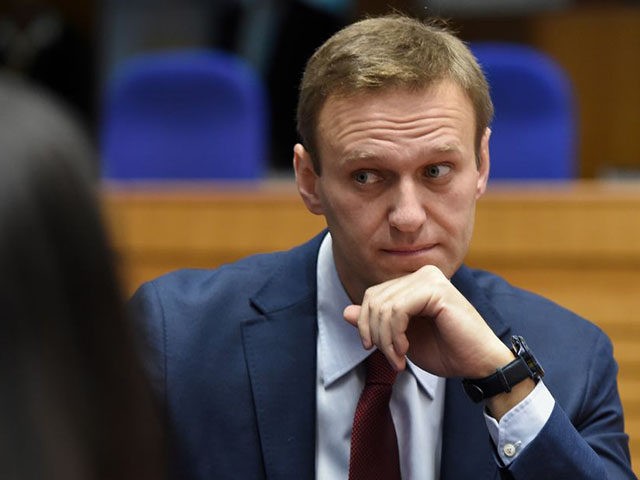A pair of pro-Kremlin humorists who call themselves “Vovan and Lexus” tricked top Amnesty International (AI) managers into admitting they “undermined” captive Russian dissident Alexei Navalny on Thursday, and seriously damaged their own credibility, by stripping Navalny of his “prisoner of conscience” status this week after an intense pressure campaign orchestrated by Russian media operatives.
Judging by the responses to the prank collected by the UK Daily Mail, the prank Zoom call could be one of the worst public relations disasters to befall Amnesty International. Leonid Volkov, the Navalny ally impersonated by Vovan and Lexus, said the entire AI leadership showed itself to be “unfit” by falling for the gag.
“In 2021, you can’t run a charity with over 300M Euro annual budget (!) and allow yourself to be tricked and humiliated in such [a] way,” Volkov said.
Vovan and Lexus (real names Alexei Stolyarov and Vladimir Kuznetov) are professional phone pranksters. Their routine involves impersonating famous people over the phone and goading their targets into making embarrassing statements. The pranksters deny they are agents of the Kremlin, but their targets are almost invariably Russian President Vladimir Putin’s critics and political enemies.
Their big break came when they called singer and gay rights activist Elton John in 2020 pretending to be Putin himself, offering a candid discussion of gay rights in Russia. Vovan and Lexus claim it is surprisingly easy to get in touch with prominent people, and their targets usually make little effort to verify the identity of their callers. Critics of their act suspect Russian intelligence agencies help to set up their prank calls.
Vovan and Lexus managed to loop Amnesty International Acting Secretary-General Julie Verhaar, Eastern European operations chief Marie Struthers, and head Eastern European researcher Denis Krivosheev into a Zoom call on Thursday by claiming they were Navalny campaign chief Leonid Volkov, calling to complain about the removal of Navalny’s status as a “prisoner of conscience” on Wednesday.
Most of the recorded Zoom call was not an exercise in knee-slapping absurdity, as the Russian pranksters evidently did a decent job of impersonating Volkov, and the AI executives seemed to genuinely regret their action against Navalny.
“When you were angry you were entirely justified and frankly it’s done damage to us as well because frankly in Russia there is no case that’s more important and more regretful to undermine – and that’s what happened, unintentionally,” Krivosheev told the caller he thought was Volkov.
Struthers added her opinion that AI had “done more harm than good” by condemning Navalny for supposedly racist remarks he made 15 years ago while he was locked up on politically motivated charges.
“’We’ve had a discussion about the fallout that happened yesterday and we’re really looking to have this call to see how we can move forward because it was really none of our intention to have this happen. We really want Mr Navalny, his case and his unjust detention to be at the forefront of what we’re doing,” Verhaar said.
Unfortunately for AI, Krivosheev made it clear he was primarily concerned about his organization’s reputation. “We would like to move the media attention away from Amnesty’s internal decisions and the language it uses and how it comes to them because this will do more damage. And frankly these are difficult processes for us to deal with. Let’s move to the message: ‘Navalny, get him out,’” he told the pranksters in a particularly awkward moment.
Asked if AI might reinstate Navalny’s prisoner of conscience status, Krivosheev replied, “I don’t think it would do anyone any good for anyone for Amnesty to flip once again and say no, no, we changed our mind.”
The AI staffers also remained embarrassingly clueless when the pranksters began slipping absurd comments into the final minutes of the conversation. They evidently remained convinced they had spoken with Volkov until the real Volkov roasted them on Twitter.
“Hmm, General Secretary of Amnesty thanks me for the constructive, direct conversation. But only I do not know her, and have never spoken to her; I wouldn’t be surprised if she spoke to ‘prankster Vovan’; I would not be surprised if they make decisions on the basis of such messages,” Volkov sneered, correctly deducing who the AI executives actually spoke with.
AI’s latest public statements on the Navalny affair concede that an organized disinformation campaign was waged by the Kremlin to revoke Navalny’s prisoner of conscience designation, but insist the info op did not influence the organization’s decision.
Navalny himself was unavailable for comment on the AI fiasco, having been secretly shuffled off to an undisclosed penal colony to serve out his 2.5-year sentence. His lawyer Vadim Kobzev said on Thursday he did not know Navalny had been moved until he tried to visit his client at his former cell in Moscow.

COMMENTS
Please let us know if you're having issues with commenting.